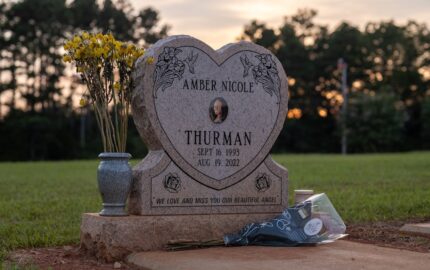CAMBRIDGE, Mass. – The Sacramento Bee has won the 2013 Worth Bingham Prize for Investigative Journalism for its five-part series Nevada Patient Busing.
The Bee’s investigation found that over the course of five years, the Rawson-Neal Psychiatric Hospital in Las Vegas transported more than 1,500 mentally ill patients out of Nevada by bus, sending at least one person to every state in the continental United States. A third of those patients were sent to California.
Many patients were sent away without plans for treatment or housing and in some cases, to cities where they had no personal contacts. Some of them were violent offenders who committed crimes in their new cities, including one murder.
The reporting focused on Greyhound bus receipts kept by Nevada’s mental health division between 2008-2013, which were used to trace those affected by the practice of patient dumping.
The series begins with a profile of James Flavy Coy Brown, a 48-year-old man suffering from schizophrenia, anxiety and depression who was discharged from Rawson-Neal and given a one way ticket to Sacramento with only minimal food and medication and instructions to call 911 when he reached California. Despondent and confused when he arrived, he considered suicide before making his way to a homeless shelter and then the UC Davis Medical Center, where he was admitted for treatment. The Bee pieced his story together by interviewing him at length, finding relatives across the country and talking to his doctors, social workers and caregivers.
Lead reporters Cynthia Hubert and Phillip Reese spent months tracking down former patients and others involved in the story, interviewing hundreds of people in the process. They found patients serving prison time, staying in nursing homes and living on the street. Other Bee staffers who contributed to the series were photographer Renee Byer, graphic artist Nathaniel Levine, researcher Pete Basofin, presentation editor Robert Casey and editor Deborah Anderluh.
The series has spurred a number of changes and reforms. The Rawson-Neal Hospital fired two staffers, disciplined others and announced that it will no longer bus patients without chaperones. The hospital has lost its accreditation and remains in danger of losing its federal Medicare funding, pending demands for improvements.
Additionally, Nevada legislators increased funding for mental health by roughly $30 million and state and federal agencies are reviewing the hospital’s treatment protocols. Nev. Gov. Brian Sandoval created a special council to review the state’s mental health care system and make recommendations for improvements. The city of San Francisco filed a class-action lawsuit seeking to recoup the costs of taking care of patients bused to them and that lawsuit is pending. Private attorney Mark Merin in Sacramento also filed a class-action lawsuit on behalf of Brown and other patients bused out of state which was dismissed in federal courts in February 2014. Merin is planning to appeal.
Brigham Prize judge Lisa Chedekel, said, “The Sacramento Bee’s series would be one of the most remarkable investigative stories of the year, even if it didn’t come at a time when the entire nation is grappling with mental health, in the wake of Sandy Hook and other high-profile incidents.The Bee showed incredible grit by sticking with the story to examine the policy’s impact not just on individuals and families, but on communities where patients showed up, in terms of crimes and violence. No series that I can recall in the past five years has so compellingly driven home the lack of resources for mental health care in this country.”
Another Bingham judge, Michael Finnegan, added: “The Sacramento Bee articles offer a classic illustration of how investigative reporting on a story of national significance can expose government wrongdoing that harms the public – and also to get something done about it. The patients affected were often utterly unprepared to start a new life in a new city. Many had no family, friends or support system when they arrived at their destinations. Through dogged reporting, the Bee got Greyhound receipts, patient rosters and criminal records showing that some of the patients wound up committing crimes as serious as murder. The Bee articles were a major public service.”
Bingham judge Stuart Watson noted: “The Sacramento Bee puts faces and names on the victims of apathy and ‘easy tolerance’ our state mental health hospitals have for mentally ill patients. The Bee uses new records (bus manifests – who knew?) to ingeniously track down and expose a new twist on the old story of patient dumping. Pulling the thread of one man’s story unravels a tapestry of more than a thousand patients shipped blindly all over the country to become someone else’s problem. Thank you for your fine work in opening our eyes.”
The $20,000 Bingham Prize will be presented to The Sacramento Bee on April 10, 2014, at the Nieman Foundation for Journalism at Harvard University in Cambridge, Mass.
Judges for this year’s prize were: James Baxter, editor and publisher of the Canadian website iPolitics; Lisa Chedekel, senior writer and co-founder of the Connecticut Health Investigative Team (C-HIT) and winner of the 2006 Bingham Prize; Michael Finnegan, staff writer at the Los Angeles Times and winner of the 2011 Bingham Prize; Lisa Mullins, radio anchor and reporter; James Neff, investigations editor at The Seattle Times who edited the series that won the 2010 Bingham Prize; Jim Schaefer, investigative reporter for the Detroit Free Press and winner of the 2008 Bingham Prize; and Stuart Watson, investigative reporter at WCNC in Charlotte, N.C. Baxter, Mullins and Watson all studied at Harvard as Nieman Fellows.
The Worth Bingham Prize honors investigative reporting of stories of national significance where the public interest is being ill-served. Worth Bingham, who died at the age of 34, achieved prominence as an investigative journalist and was vice president and assistant to the publisher for the Louisville Courier-Journal. His family and friends created the prize in his memory in 1967. He was a 1954 Harvard University graduate.
The Nieman Foundation for Journalism at Harvard educates leaders in journalism and elevates the standards of the profession through special programs that convene scholars and experts in all fields. More than 1,400 accomplished and promising journalists from 92 countries have been awarded Nieman Fellowships since 1938. The foundation’s other initiatives include Nieman Reports, a quarterly print and online magazine that explores contemporary challenges and opportunities in journalism; the Nieman Journalism Lab, a website that reports on the future of news, innovation and best practices in the digital media age; and Nieman Storyboard, a website that showcases exceptional narrative journalism and explores the future of nonfiction storytelling.
The Bee’s investigation found that over the course of five years, the Rawson-Neal Psychiatric Hospital in Las Vegas transported more than 1,500 mentally ill patients out of Nevada by bus, sending at least one person to every state in the continental United States. A third of those patients were sent to California.
Many patients were sent away without plans for treatment or housing and in some cases, to cities where they had no personal contacts. Some of them were violent offenders who committed crimes in their new cities, including one murder.
The reporting focused on Greyhound bus receipts kept by Nevada’s mental health division between 2008-2013, which were used to trace those affected by the practice of patient dumping.
The series begins with a profile of James Flavy Coy Brown, a 48-year-old man suffering from schizophrenia, anxiety and depression who was discharged from Rawson-Neal and given a one way ticket to Sacramento with only minimal food and medication and instructions to call 911 when he reached California. Despondent and confused when he arrived, he considered suicide before making his way to a homeless shelter and then the UC Davis Medical Center, where he was admitted for treatment. The Bee pieced his story together by interviewing him at length, finding relatives across the country and talking to his doctors, social workers and caregivers.
Lead reporters Cynthia Hubert and Phillip Reese spent months tracking down former patients and others involved in the story, interviewing hundreds of people in the process. They found patients serving prison time, staying in nursing homes and living on the street. Other Bee staffers who contributed to the series were photographer Renee Byer, graphic artist Nathaniel Levine, researcher Pete Basofin, presentation editor Robert Casey and editor Deborah Anderluh.
The series has spurred a number of changes and reforms. The Rawson-Neal Hospital fired two staffers, disciplined others and announced that it will no longer bus patients without chaperones. The hospital has lost its accreditation and remains in danger of losing its federal Medicare funding, pending demands for improvements.
Additionally, Nevada legislators increased funding for mental health by roughly $30 million and state and federal agencies are reviewing the hospital’s treatment protocols. Nev. Gov. Brian Sandoval created a special council to review the state’s mental health care system and make recommendations for improvements. The city of San Francisco filed a class-action lawsuit seeking to recoup the costs of taking care of patients bused to them and that lawsuit is pending. Private attorney Mark Merin in Sacramento also filed a class-action lawsuit on behalf of Brown and other patients bused out of state which was dismissed in federal courts in February 2014. Merin is planning to appeal.
Brigham Prize judge Lisa Chedekel, said, “The Sacramento Bee’s series would be one of the most remarkable investigative stories of the year, even if it didn’t come at a time when the entire nation is grappling with mental health, in the wake of Sandy Hook and other high-profile incidents.The Bee showed incredible grit by sticking with the story to examine the policy’s impact not just on individuals and families, but on communities where patients showed up, in terms of crimes and violence. No series that I can recall in the past five years has so compellingly driven home the lack of resources for mental health care in this country.”
Another Bingham judge, Michael Finnegan, added: “The Sacramento Bee articles offer a classic illustration of how investigative reporting on a story of national significance can expose government wrongdoing that harms the public – and also to get something done about it. The patients affected were often utterly unprepared to start a new life in a new city. Many had no family, friends or support system when they arrived at their destinations. Through dogged reporting, the Bee got Greyhound receipts, patient rosters and criminal records showing that some of the patients wound up committing crimes as serious as murder. The Bee articles were a major public service.”
Bingham judge Stuart Watson noted: “The Sacramento Bee puts faces and names on the victims of apathy and ‘easy tolerance’ our state mental health hospitals have for mentally ill patients. The Bee uses new records (bus manifests – who knew?) to ingeniously track down and expose a new twist on the old story of patient dumping. Pulling the thread of one man’s story unravels a tapestry of more than a thousand patients shipped blindly all over the country to become someone else’s problem. Thank you for your fine work in opening our eyes.”
The $20,000 Bingham Prize will be presented to The Sacramento Bee on April 10, 2014, at the Nieman Foundation for Journalism at Harvard University in Cambridge, Mass.
Judges for this year’s prize were: James Baxter, editor and publisher of the Canadian website iPolitics; Lisa Chedekel, senior writer and co-founder of the Connecticut Health Investigative Team (C-HIT) and winner of the 2006 Bingham Prize; Michael Finnegan, staff writer at the Los Angeles Times and winner of the 2011 Bingham Prize; Lisa Mullins, radio anchor and reporter; James Neff, investigations editor at The Seattle Times who edited the series that won the 2010 Bingham Prize; Jim Schaefer, investigative reporter for the Detroit Free Press and winner of the 2008 Bingham Prize; and Stuart Watson, investigative reporter at WCNC in Charlotte, N.C. Baxter, Mullins and Watson all studied at Harvard as Nieman Fellows.
The Worth Bingham Prize honors investigative reporting of stories of national significance where the public interest is being ill-served. Worth Bingham, who died at the age of 34, achieved prominence as an investigative journalist and was vice president and assistant to the publisher for the Louisville Courier-Journal. His family and friends created the prize in his memory in 1967. He was a 1954 Harvard University graduate.
The Nieman Foundation for Journalism at Harvard educates leaders in journalism and elevates the standards of the profession through special programs that convene scholars and experts in all fields. More than 1,400 accomplished and promising journalists from 92 countries have been awarded Nieman Fellowships since 1938. The foundation’s other initiatives include Nieman Reports, a quarterly print and online magazine that explores contemporary challenges and opportunities in journalism; the Nieman Journalism Lab, a website that reports on the future of news, innovation and best practices in the digital media age; and Nieman Storyboard, a website that showcases exceptional narrative journalism and explores the future of nonfiction storytelling.


